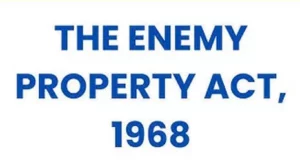GS2 (Governance & Laws)

Overview of the Enemy Property Act, 1968
- Enactment: The Act was introduced following the Indo-China conflict of 1962 and the Indo-Pak wars of 1965 and 1971.
- Definition of Enemy Property: It refers to any assets owned, held, or managed on behalf of an individual, entity, or firm classified as an “enemy.”
- Interpretation of ‘Enemy’ and ‘Property’:
- An “enemy” is any country that has declared war or engaged in hostilities against India.
- “Property” includes both immovable assets (land, buildings) and negotiable instruments such as shares, bonds, and debentures.
Key Provisions of the Act
- Inheritance Restrictions: The descendants of individuals who migrated to Pakistan or China do not have legal rights over the properties left behind by their ancestors.
- Scope of Application: The Act applies to properties abandoned by people who moved to China after the 1962 Sino-Indian war and to Pakistan following the wars of 1965 and 1971.
- Custodian of Enemy Property for India (CEPI):
- Established to manage and administer enemy properties.
- Has authority to lease or sell these assets to state governments for public use.
Amendments and Supreme Court Ruling
Enemy Property (Amendment and Validation) Act, 2017
- Broadened the definition of “enemy subject” and “enemy firm” to include legal heirs and successors of an enemy, regardless of nationality.
- Once designated as enemy property, an asset retains this status indefinitely—even if the original owner or successor dies, the business dissolves, or nationality changes.
Supreme Court Verdict on Ownership
- In response to an appeal by the Lucknow Municipal Corporation against an Allahabad High Court ruling on property tax disputes related to enemy properties, the Supreme Court ruled:
- CEPI is not the owner of these properties but acts as a trustee responsible for administration and management.
- The Government of India does not hold ownership rights over enemy properties.
Custodian of Enemy Property for India (CEPI)
- Functioning: Operates under the Ministry of Home Affairs.
- Legal Authority: Recognized as a statutory body under the Enemy Property Act, 1968.
- Powers: Possesses legal authority equivalent to a civil court under the Code of Civil Procedure, 1908




